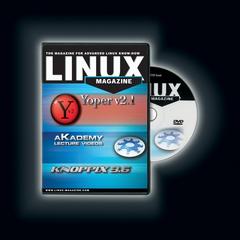Letters to the editor
Write access

Letters to the editorWrite access |

|

Silly question, but what is the best way to play the aKademy videos on the Linux Magazine #48 DVD? As my Debian machine is tied up for a day or two, I have at my disposal Windows XP and Knoppix 3.4.
Can I suggest a little more information on the DVD? That would be helpful: a few html pages or a link would greatly enhance the experience.
Thanks for a great magazine. I have learned something new every issue, and I cannot ask for anything more.
Frank, by email
LM We often think we should provide a special box with information on how to use the DVDs on our DVD pages in the magazine. We will make an effort to provide more information on our DVDs in the future, but the number of possible troubleshooting questions is so vast that we will probably never have room to cover everything.
Here's some information on the video codec to play the aKademy videos from Linux Magazine #48 DVD: Your player probably is lacking the appropriate theora codec. If you have an RPM-based system, you might check your Player installation:
(with Helix) $ rpm -ql HelixPlayer | grep theora /usr/local/HelixPlayer/plugins/theorarend.so (RealPlayer) $ rpm -ql RealPlayer | grep theora /usr/local/RealPlayer/plugins/theorarend.so
On our machine, ogginfo is part of vorbistools, an old package that does not contain or recognize the theora format.
On an RPM-based distro, get either the Helix or Real player from the website and install it with the package manager (you don't even need to register):
https://player.helixcommunity.org/2004/downloads/
For other systems, get the so-called Installer binaries:
wget https://helixcommunity.org/download.php/635/hxplay-1.0.1.bin chmod +x hxplay-1.0.1.bin ./hxplay-1.0.1.bin
You need to do the same thing for the Real Player. With either of these players, we had no problems playing the files on correctly-configured video and audio systems.
Could you include a Linux distro on one of your DVDs that is created and used for network security? The only distro I have found so far is Auditor, but I'm sure you must know of others. Many people use these kinds of distros to monitor and test network packets and connectivity.
If this is possible, it will certainly make an old man happy. Keep up the great work. So long for now.
Martin A. Wrobel, Michigan, USA
LM There are some distros available that focus on security and auditing. Linux Magazine has already featured a few of them, and we will continue to do so.
You mentioned Auditor Security Collection, http://www.remote-exploit.org. There is also Insert, the Inside Security Rescue Toolkit, http://www.inside-security.de/insert_en.html, which we included recently on Linux Magazine's Issue 47 / October DVD "Knoppix Collection".
Issue 40 / March had a DVD with several security tools, including The Packetmaster, http://www.thepacketmaster.com, and FIRE, http://fire.dmzs.com. The latter targets forensics. There is also Local Area Security Linux, http://www.localareasecurity.com, or Knoppix-STD, http://www.knoppix-std.org. You'll find a comprehensive list at http://www.frozentech.com/content/livecd.php?sort=&showonly=security.
You'll find more information on the software included with past Linux Magazine DVDs in the Linux Magazine Archive: https://www.linux-magazine.com/Magazine/Archive.
| Erratum: Ghostscript |
|
Those who study code may have noticed some strange characters in the listings of the article "Perfect Patterns: Linux Printing: Ghostscript, Foomatic, and Gimp-Print" in Issue #48 / November of Linux Magazine. Actually, the character, a capital "U", was not so strange by itself, but the appearance of the "U" at random points in the listings was indeed unusual and altogether incorrect. The article was derived from an article in another Linux New Media publication. The character expressed as a "U" was actually a code continuation arrow in the original article. The "U"s unfortunately swept into the code as part of the document conversion process. You will find a revised version of the article with corrected listings at the Linux Magazine website: |